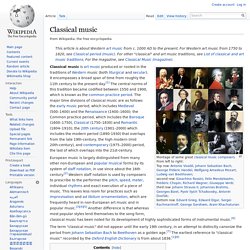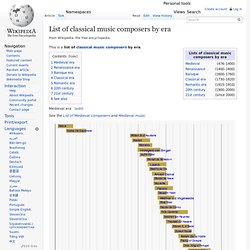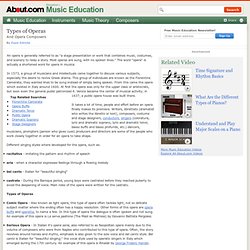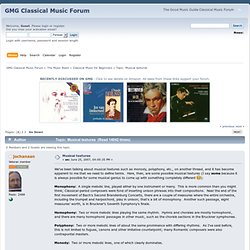

MUSIC 101 > Zosel > Flashcards > Listening Guides. Search for Definition. MUSIC OUTLINE. Bwv140 - Kantat - 01 - Koral - Wachet auf. Classical music. Montage of some great classical music composers.

From left to right: Top row: Antonio Vivaldi, Johann Sebastian Bach, George Frideric Handel, Wolfgang Amadeus Mozart, Ludwig van Beethoven; second row: Gioachino Rossini, Felix Mendelssohn, Frédéric Chopin, Richard Wagner, Giuseppe Verdi; third row: Johann Strauss II, Johannes Brahms, Georges Bizet, Pyotr Ilyich Tchaikovsky, Antonín Dvořák; bottom row: Edvard Grieg, Edward Elgar, Sergei Rachmaninoff, George Gershwin, Aram Khachaturian The term "classical music" did not appear until the early 19th century, in an attempt to distinctly canonize the period from Johann Sebastian Bach to Beethoven as a golden age.[7] The earliest reference to "classical music" recorded by the Oxford English Dictionary is from about 1836.[1][8] Characteristics[edit] Literature[edit] The most outstanding characteristic of classical music is that the repertoire tends to be written down in musical notation, creating a musical part or score.
Instrumentation[edit] List of classical music composers by era. List of classical music composers by era From Wikipedia, the free encyclopedia Jump to: navigation, search This is a list of classical music composers by era.

Contents [hide] Medieval era[edit] See the List of Medieval composers and Medieval music. Renaissance era[edit] See the List of Renaissance composers and Renaissance music. Baroque era[edit] Types of Operas - The Different Types of Operas. An opera is generally referred to as "a stage presentation or work that combines music, costumes, and scenery to relay a story.

Most operas are sung, with no spoken lines. " The word "opera" is actually a shortened word for opera in musica. In 1573, a group of musicians and intellectuals came together to discuss various subjects, especially the desire to revive Greek drama. This group of individuals are known as the Florentine Camerata; they wanted lines to be sung instead of simply being spoken. From this came the opera which existed in Italy around 1600. It takes a lot of time, people and effort before an opera finally makes its premiere. Different singing styles where developed for the opera, such as: Musical textures. Texture = combo of pitch, timbre & rhythm measured in terms of DENSITY Some writers have also described a "pointalistic" texture to describe the music of postwar serialism such as Boulez's Structures Pointillism (octave displacements, rests, articulation and dynamics) & what about Klangfarbenmelodien (sound color melody) some good works that highlight those things off the top...

Pierre Boulez's Sonata No. 2 (advanced pointillism throughout and control over climax, direction and drama), Stravinsky's Elegy for J.F.K. (pointillism used sparingly for contrast in free atonal lines), Webern's Cantata (striking use of Klangfarbmelodien, and constant use of pointillistic techniques) and Webern's Symphony for Chamber Orchestra (extremes of brevity and klang, note especially the importance of each note within the directed confines of each line) Chapter 8 - Musical Texture. Reasons of Listening to Classical Music. Are you a nerd? Chances are that if you clicked this link then the answer to that is a proud “hell yeah!”. Well I am too, and one of my most surprising nerd revelations was discovering that classical music is a perfect musical genre for people like us. I didn’t work this out until I was about 23, and until that point pretty much had no idea of all the delicious geeky goodness contained within.
If you’re like me then you’ve probably listened to quite a few classical pieces, but haven’t ever really, really gotten into them — at least not in the same way as your favorite non-classical pieces of music. Here are 7 reasons why if you are a true nerd you should seriously consider giving classical music a more serious listen: 1. 3. 4. 5. 6. 7. How to Talk About Classical Music. There may come a time when your encyclopedic knowledge of Journey’s formative years comes in handy, but when your boss invites you to a symphony, don’t stop believing that these highlights of the genre will be enough to see you safely through.
By Lorin Wilkerson When it comes to learning how to talk in some kind of coherent fashion about a complicated subject like classical music, the challenges for the newcomer are manifold. How do you grasp the basic concepts? How do you apply them to the music you are hearing? How do you speak intelligently to someone who might know a great deal more about it than you do? But if the boss has suddenly invited you to a Mozart symphony, or you’re the lucky guy who gets to entertain a well-heeled, music-loving client in town next week and you need to figure something out right now, there may not be time for that. Listen Listen! Teoría - Music Theory Web. History of Music. As of July 1, 2013 ThinkQuest has been discontinued.

We would like to thank everyone for being a part of the ThinkQuest global community: Students - For your limitless creativity and innovation, which inspires us all. Teachers - For your passion in guiding students on their quest. Partners - For your unwavering support and evangelism. Classical Music 101.